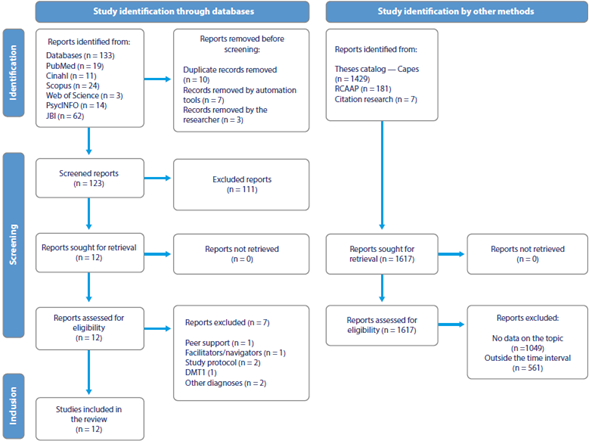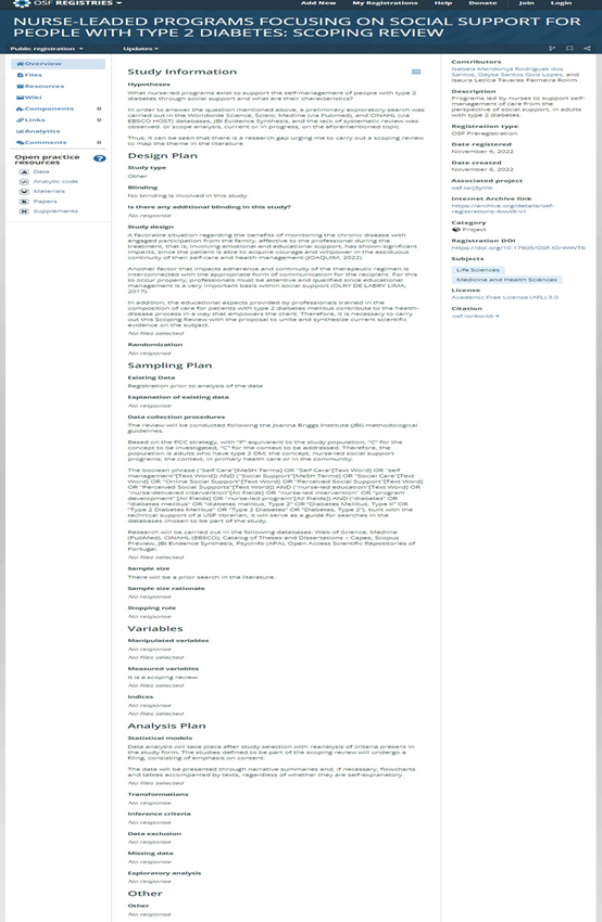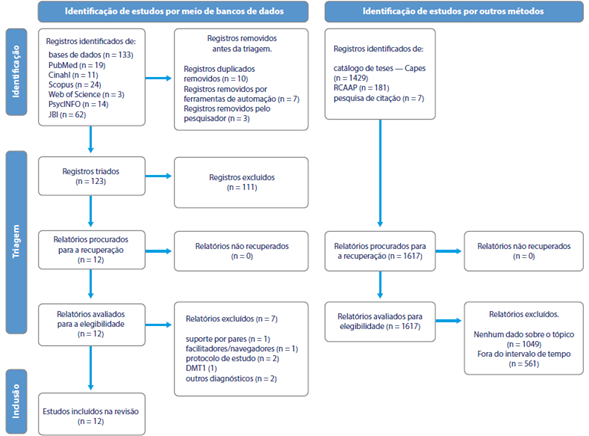Nurse-Led Programs Focusing on Social Support for People with Type 2 Diabetes Mellitus: A Scoping Review *
Programas centrados en el apoyo social para personas con diabetes mellitus tipo 2 dirigidos por enfermeros: revisión de alcance **
Article
[0000-0002-1502-7594] Isabela Mendonça Rodrigues dos Santos[****]
[0000-0002-8453-2543] Isaura Letícia Palmeira Tavares Rolim[*****]
[0000-0002-7675-412X] Aurean D’Eça Júnior[******]
[0000-0003-3234-2833] Maria Almira Bulcão Loureiro[*******]
[0000-0002-7966-8075] Diogo Matheus Barros da Silva[********]
[0000-0002-6801-1940] Geysa Santos Góis Lopes[*********]
[****] Universidade Federal do Maranhão, Brazil isabela.mrs@discente.ufma, https://orcid.org/0000-0002-1502-7594
[*****] Universidade Federal do Maranhão, Brazil leticia.isaura@ufma.br, https://orcid.org/0000-0002-8453-2543
[******] Universidade Federal do Maranhão, Brazil aurean.junior@ufma.br, https://orcid.org/0000-0002-7675-412X
[*******] Universidade Federal do Maranhão, Brazil almira.maria@discente.ufma.br, https://orcid.org/0000-0003-3234-2833
[********] Universidade Federal do Maranhão, Brazil silva.diogo@discente.ufma.br, https://orcid.org/0000-0002-7966-8075
[*********] Rede Sarah Hospitalar, Brazil geysagois@hotmail.com, https://orcid.org/0000-0002-6801-1940
Date received: 20/6/2023
Date accepted: 03/11/2023
Abstract
Introduction:
Nurse-led programs have a determinant role in the engagement of individuals in the self-management of type 2 diabetes mellitus (T2DM), as they contribute to improving quality of life. Self-management assisted by social support is vital, especially as it describes the importance of nurses in promoting health for people with T2DM, as this intervention can help reduce the consequences and progression of the disease.
Materials and Methods:
This is a scoping review in line with the methodological guidelines of the Joanna Briggs Institute. The search descriptors used were “autocuidado” (self-care), “intervenção liderada por enfermeiro” (nurse-led intervention), and “diabetes mellitus tipo 2” (type 2 diabetes mellitus), with searches in the Web of Science, Medline, CINAHL, Capes Theses and Dissertations Catalog, Scopus, JBI Evidence Synthesis, PsycINFO, and the Portuguese Open Access Scientific Repositories databases conducted between February and March 2022. The eligibility criteria were studies published within the last 10 years, in English, Spanish, and Portuguese, covering the individual’s experience in programs focused on self-management through nurse-led social support.
Results:
A total of 12 studies were included, all of which were published in the United States, England, and Iran, focusing on social support for self-management in people with T2DM, and centered on care facilities for people with chronic diseases. It was found that most nurse-led programs have been implemented in developed countries and that their main characteristic is their emphasis on social cognitive theory. The population was characterized by being mostly women, aged over 22, with a low level of education.
Conclusions:
The study met the proposed objective by demonstrating that, despite the low implementation cost with high social and economic returns, the development of these programs is still scarce. The need for further studies focusing on emotional levels, such as depression and anxiety, is highlighted.
Keywords (Source: DeCS)
Social Support, Nursing Care, Social Programs, Self-Management, diabetes mellitus type 2
Resumen
Introducción:
los programas dirigidos por enfermeras desempeñan un papel fundamental a la hora de implicar a las personas en el autocontrol de la diabetes mellitus tipo 2 (DM2), ya que repercuten en la mejora de la calidad de vida. El autocontrol respaldado por el apoyo social es crucial, especialmente porque describe la importancia de los profesionales de enfermeria en la promocion de la salud de las personas con diabetes mellitus tipo 2 (DM2), dado que esta intervencion puede ayudar a reducir las consecuencias y el empeoramiento de la enfermedad.
Objetivo:
mapear los programas centrados en el apoyo social para personas con DM2 dirigidos por enfermeros.
Materiales y método:
una revision de alcance que siguio las directrices metodologicas del Instituto Joanna Briggs. Los descriptores de busqueda utilizados fueron “autocuidado”, “intervencion dirigida por enfermeros”, “diabetes mellitus tipo 2”, con busqueda en la Web of Science, Medline, CINAHL, Catalogo de Tesis y Disertaciones de la Capes [Coordinacion de Perfeccionamiento de Personal de Nivel Superior], Scopus, JBI Evidence Synthesis, PsycINFO y Repositorios Cientificos de Acceso Abierto de Portugal, entre febrero y marzo de 2022. Los criterios de elegibilidad fueron estudios publicados en los ultimos 10 anos, en ingles, espanol y portugues, que cubrieran la experiencia individual de programas dirigidos por profesionales de enfermeria centrados en la autogestion a traves del apoyo social.
Resultados:
se incluyeron 12 estudios, publicados en Estados Unidos, Inglaterra e Iran, centrados en el apoyo social para la autogestion de personas con DM2 y en entornos de atencion a personas con enfermedades cronicas. Se observo que la mayoria de los programas dirigidos por enfermeros se aplican en paises desarrollados y tienen como caracteristica principal el enfasis en la teoria cognitiva social. El publico se caracterizo por ser mayoritariamente femenino, mayor de 22 anos y con bajo nivel de estudios.
Conclusiones:
el estudio respondio al objetivo propuesto demostrando que, a pesar del bajo costo de implementacion con alto retorno social y economico, el desarrollo de estos programas aun es considerado escaso. Se reitera la necesidad de nuevos estudios que enfaticen niveles emocionales como la depresion y la ansiedad.
Palabras clave (Fuente: DeCS):
Apoyo social, atencion de enfermeria, programas sociales, automanejo, diabetes mellitus tipo 2


